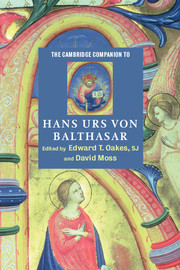Book contents
14 - Balthasar’s reading of the Church Fathers
from Part III - Disciplines
Published online by Cambridge University Press: 28 May 2006
Summary
Anyone who is even casually familiar with the writings of Hans Urs von Balthasar must know of his lifelong engagement with those towering figures of early Christian theology known collectively as 'the Church Fathers'. So extensive are his works on these theologians of antiquity that, had he bequeathed to the theological world only his patristic scholarship, his reputation would, by that legacy alone, already be assured. Of course he is known for much more than his writings on early theologians. Indeed, so large and comprehensive is his total output - to say nothing of the wide-angled vision that animates the whole - that his patristic studies must be seen as really just one component, one partial, if essential, contribution to the total picture.
Precisely because a single vision animates the totality of Balthasar’s theology, his studies of the Fathers cannot be judged in isolation from his other works. In fact, so thoroughly has he exploited his patristic scholarship to advance his overall concerns that he often puzzles those whose interests are primarily directed towards understanding early Christian theology in its own context. One expert in the field, Dom Polycarp Sherwood, put it this way:
My single studies on Maximus [a Church Father who lived in the seventh century] have had as their immediate scope the understanding of Maximus from within his own tradition. This is as it should be . . . On the other hand, Balthasar began his work in a quite different way . . .
- Type
- Chapter
- Information
- The Cambridge Companion to Hans Urs von Balthasar , pp. 187 - 206Publisher: Cambridge University PressPrint publication year: 2004
- 1
- Cited by



